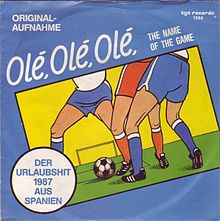- Olé, Olé, Olé
-
"Olé, Olé, Olé" (from Spanish: "Oé, Oé, Oé") is a football chant of a Spanish origin.[1] It has become associated with supporters of the Republic of Ireland national football team.
Contents
Origin
One evidence of the chant appeared in an article of the Spanish newspaper La Vanguardia from 1982. It was during the final match of the Spanish Football League that year. After Real Sociedad had been proclaimed champion, the people at the Anoeta stadium in San Sebastián started to sing "Campeones, campeones, hobe, hobe, hobe", which literally means "Champions, champions, we are the best". The latter three words belonging to the Basque language. The chant expanded to the rest of Spain, and become known as "Oé, Oé, Oé", which later was misunderstood[verification needed] by foreigners as "Olé, Olé, Olé".
The word "olé" itself, being a Spanish interjection of Arabic origin related mostly with bullfighting, but also with sports[2].
The chant is used frequently in football games around the world, and can be heard in Montreal Canadiens hockey games when the team is winning[3]. It is also used by supporters of the University of California, Santa Barbara's Gaucho intercollegiate sports teams, particularly the basketball and soccer programs, and led to the creation of a mascot, simply named Olé[4].
It was also appropriated by the supporters of the Republic of Ireland national football team[5][6].
Anderlecht Champion
"Olé, Olé, Olé (The Name of the Game)" 
Single by The Fans Released 1987 Genre Pop Label ZYX Records Writer(s) Armath - Deja Producer Roland Verlooven In 1985, Hans Kusters, the head of the Belgian label Hans Kusters Music, asked music producer Roland Verlooven and singer Grand Jojo to "write a song for the Belgian soccer champs Anderlecht called “Anderlecht Champion”"[7]. It was composed by Armath (an alias of Roland Verlooven[8]) and Deja, and recorded both in French and Dutch by the Belgian singer Grand Jojo, along with the players of R.S.C. Anderlecht, and released that year by Disques Vogue.
A year later, he recorded another version, "E Viva Mexico", which introduced the chorus "Olé, Olé, Olé, Olé, We are the champions".
Both of the versions used a slightly different variation of the chant, which probably was also originated in Spain[verification needed]. This chant was the basis for many versions to be recorded by many other artists, including the more popular 1987 hit of a group known as "The Fans". The other being Chumbawamba's 1998 hit "Top of the World (Olé, Olé, Olé)".
In 2009 it was recorded by Overtone, and used in the 2009 film Invictus.
Olé, Olé, Olé (The Name of the Game)
In 1987, Roland Verlooven produced a more popular version of the chant, "Olé, Olé, Olé (The Name of the Game)". It was recorded by a group known as "The Fans"[9], and published by Hans Kusters Music. It was released in Spain by Discos Games, and in Germany by ZYX Records. The text of it goes "Olé, olé, olé, olé, we are the champions, we are the champions", but there are widespread misunderstandings of it rather being "...we are the champs, we are the champs" by many who have simply not heard and understood the lyrics correctly.
¡Olé!
It is also the chorus of a song titled "¡Olé!", by the Bouncing Souls. This version of the song is also used by Canadian professional wrestler El Generico as his entrance theme. In Argentina, sometimes the name of a person the people could be cheering to is added at the end; e.g: "Olé, olé olé ole, Die-go, Die-go! (referring to Diego Armando Maradona).
Anderlecht Champion aka Ole, Ole, Ole, We Are The Champions aka The Name Of The Game is published by Hans Kusters Music NV.
References
- ^ http://hemeroteca.lavanguardia.es/preview/1982/04/26/pagina-21/32946597/pdf.html?search=%22Me%20siento%20feliz%22
- ^ "Desde el vestuario realista salían voces cantarinas de los jugadores que se apuntaban al clarnor popular: «Campeones hobe, hobe, hobe». Lo de hobe se puede traducir por el mejor en la lengua vasca"
- ^ http://montreal.ctv.ca/servlet/an/local/CTVNews/20100420/mtl_habslose_100420/20100420/
- ^ http://ucsbgauchos.cstv.com/genrel/blank_ole00.html
- ^ "A GREAT DAY FOR THE IRISH AS ITALY IS DEFEATED, 1-0". The Record (Bergen County, NJ). 1994-06-19. "Banging on bodhran drums, the Irish were on their feet -- an hour before game time. They chanted, "Ole, ole," their national soccer cheer, imported from Spain"
- ^ Doyle, John (June 7, 2002). "Green Army conquering with smiles". The Globe and Mail. http://www.theglobeandmail.com/servlet/ArticleNews/TPStory/LAC/20020607/SJOHNX.
- ^ http://web.archive.org/web/20080514201924/http://www.hanskustersmusic.com/home/index.php?option=com_content&task=view&id=12&Itemid=26
- ^ http://www.discogs.com/artist/Roland+Verlooven
- ^ http://www.discogs.com/artist/Fans%2C+The The Fans Discography at Discogs
See Also
- OLE (disambiguation)
External links
- Anderlecht Champion at The Originals
- Ole, Allah and all Claim for the etymology of olé from Allaah (Allah, God) and lack of evidence
Republic of Ireland national football team General Venues Statistics Complete list of matches (1924–present) · Irish Free State results (1924–1935) · Ireland (FAI) results (1936–1954)
Republic of Ireland results (1955–present) — (1955–1959) · (1960–1969) · (1970–1979) · (1980–1989) · (1990–1999) · (2000–2009) · (2010–present)Players Players · Dual Irish playersWorld Cup finals European finals Other tournaments 1924 Summer Olympics · 1948 Summer Olympics · Brazil Independence Cup (1972) · Kirin Cup (1984) · Iceland Triangular Tournament (1986) · U.S. Cup (1992, 1996, 2000) · Unity Cup (2004) · Nations Cup (2011–)Famous matches 1949 defeat of England · UEFA Euro 2000 play-off against Turkey · 2010 FIFA World Cup play-off against FranceCulture Other FA teams Categories:- Association football stubs
- Republic of Ireland association football songs
- Spanish loanwords
Wikimedia Foundation. 2010.
